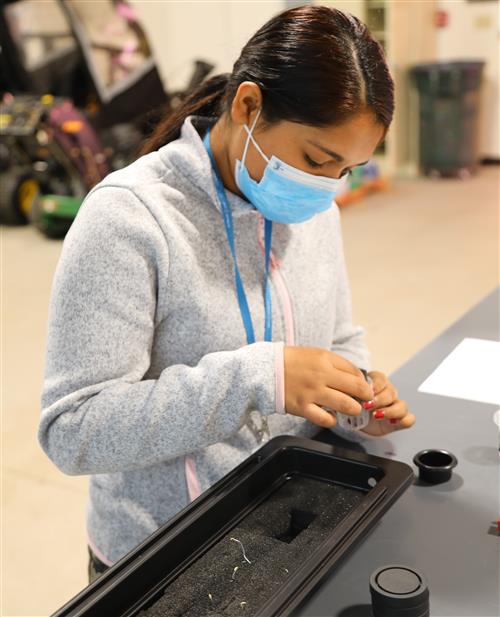Horticulture / Landscaping Management
Page Navigation
- Erie High School
- Overview
-
Horticulture / Landscaping Management



Horticulture/Landscaping Video
CIP Code: 01.0601
Instructor: Patrick Allen
Pathway: Science and HealthIf you have a green thumb, our Horticulture/Landscape Management program will give you the technical knowledge and practical skills you need to produce, process and market plants, shrubs and trees for outdoor landscaping and interior plantscaping. You'll gain the management and interpersonal communication skills needed to establish, manage and market a horticulture enterprise, a major career path in the US today.Your coursework will cover basic landscape design, brick ornamentation, and outdoor beautification projects. And our program grows culinary herbs in partnership with the Erie School District food service.
Certifications: OSHA 10-Agriculture, S/P2, PA Pesticide Applicator Certification, Certified Landscape Technician, National Safe Tractor and Machinery Operator
Requirements / Expectations
A desire to learn mechanical skills, to work out of doors, average or above reading, writing, math and science skills and the stamina to stoop and lift heavy objects in the creation and maintenance of landscape or green house setting.
Introduction - Program of StudyPennsylvania’s secondary schools offer many vocational programs in agriculture education, such as applied horticulture. Greenhouse and nursery workers, landscapers and ground maintenance workers are two career choices involving the study of applied horticulture. Workers in both occupations concentrate on the care and upkeep of vegetation. Typically, applied horticulture workers maintain grounds of property using hand or power equipment. Being skilled in the use and operation of various powered and non-powered equipment is essential for the worker employed in any applied horticulture career.
Many plant lovers begin their careers by working on grounds maintenance crews or in greenhouses and nurseries. Workers typically perform a variety of tasks, which may include any combination of the following: sod laying, mowing, trimming, planting, watering, fertilizing, digging, raking, sprinkler installation, and installation of segmental concrete masonry wall units.
Maintenance of tools and operational systems are some of the tasks related to employment in applied horticulture careers. These tasks may include the maintenance and repair of irrigation systems, climate control systems, and building structures such as greenhouses, fences or benches. Workers may also provide proper upkeep of sidewalks, driveways, parking lots, fountains, planters, burial sites or other grounds features.
Greenhouse and nursery workers start the growth of various flowers, shrubs, and young plants or seedlings, in a controlled environment. When the plants are hardy enough, nursery workers transplant them to open fields and then fertilize themand set up irrigation systems. When the plants are ready for sale, greenhouse or retail workers help customers to find the ones that best suit their needs. Greenhouse workers may inspect plants and buds to assess quality; dig, cut, and transplant seedlings, cuttings, trees and shrubs; harvest plants; and, transplant, pot and label the seedlings. Greenhouse workers may also need to be skilled in the use of mixing, spraying or spreading fertilizers, herbicides, or insecticides onto plants.
Grounds maintenance workers are best known in this industry as landscapers, groundskeepers or gardeners. These workers perform the familiar tasks of mowing, watering, fertilizing, pruning, and weeding landscapes and gardens. They follow design specifications for installing flowers, plants, lighting, and sprinkler systems, and for building walkways, patios, and decks. Some ground maintenance workers specialize in applying pesticides and, in most states, receive training and licensure. Others become tree trimmers and pruners.
The tasks that grounds maintenance workers do depend on where they work. Those who work on sports fields, golf courses, or other kinds of turf use special equipment under the direction of turf managers. Workers may need to haul and spread topsoil, fertilizer, peat moss, and other materials to condition soil, using wheelbarrows or carts and shovels. Other grounds maintenance workers are hired for residential jobs involving the care of yards and gardens. Still others work in cemeteries, hospitals, universities, and other institutions that have a campus.
Assumptions of this Program of Study
High quality programs should meet the following standards:
1. Promote positive working relationships.
2. Implement a curriculum that fosters all areas of skill development
3. Use appropriate and effective teaching approaches.
4. Provide ongoing assessments of student progress.
5. Employ and support qualified teaching staff.
6. Establish and maintain relationships and use resources of the community.
7. Provide a safe and healthy learning environment.
8. Implement strong program organization and supervision policies that result in high quality teaching and learning.
9. Integrate academic skills and aptitudes necessary for postsecondary education, gainful employment and a foundation of lifelong learning.
CIP Code: 01.0601An instructional program having a combination of organized subject matter and practical experiences that generally prepares individuals to produce, process and market plants, shrubs and trees used principally for ornamental, recreational and aesthetic purposes and to establish, maintain and manage horticultural enterprises. Instruction emphasizes knowledge, understanding and application important to establishing, maintaining and managing horticultural enterprises such as aboriculture, floriculture, greenhouse operation and management, landscaping, nursery operation and management and turf management.

